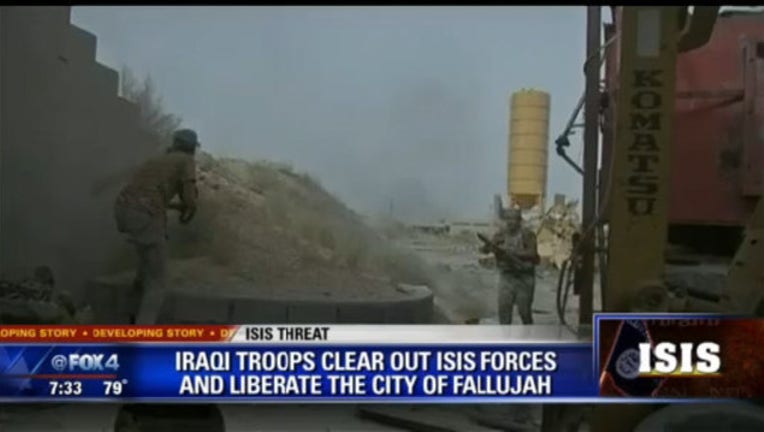Iraqi commander: Fallujah 'fully liberated' from ISIS

BAGHDAD (AP) — A senior Iraqi commander said the city of Fallujah was "fully liberated" from Islamic State militants on Sunday, after a more than monthlong military operation.
Iraqi troops have entered the northwestern al-Julan neighborhood, the last area of Fallujah to remain under IS control, the head of the counterterrorism forces in the operation, Lt. Gen. Abdul-Wahab al-Saadi, told The Associated Press.
Al-Saadi said the operation, which began in late May, "is done and the city is fully liberated." The Iraqi army was backed by U.S.-led airstrikes and paramilitary troops, mostly Shiite militias.
"From the center of al-Julan neighborhood, we congratulate the Iraqi people and the commander in chief...and declare that the Fallujah fight is over," he told Iraqi state TV, flanked by military officers and soldiers. Some of the soldiers were shooting in the air, chanting and waving the Iraqi flag.
He added that troops will start working on removing bombs from the city's streets and buildings.
Prime Minister Haider al-Abadi declared victory in Fallujah over a week ago, after Iraqi forces advanced into the city center and took control of a government complex. He pledged that remaining pockets of IS fighters would be cleared out within hours, but fierce clashes on the city's northern and western edges persisted for days.
Tens of thousands of people have fled the fighting, overwhelming camps for the displaced run by the government and aid groups.
According to the U.N. refugee agency, more than 85,000 people have fled Fallujah and the surrounding area since the offensive began. The UNHCR and others have warned of dire conditions in the camps -- where temperatures are well over 40 degrees Celsius (104 F) and shelter is limited -- and have called for more funds to meet mounting needs.
Fallujah, which is located about 40 miles (65 kilometers) west of Baghdad, was the first city to fall to IS, in January 2014.
Fallujah was also a stronghold of Sunni insurgents following the U.S.-led invasion in 2003. More than 100 American soldiers died and hundreds more were wounded in intense, house-by-house fighting in Fallujah in 2004.
IS extremists still control significant areas in northern and western Iraq, including the country's second-largest city, Mosul. The group declared an Islamic caliphate on the territory it holds in Iraq and Syria and at the height of its power was estimated to hold nearly a third of each country.
More than 3.3 million Iraqis have fled their homes since IS swept across northern and western Iraq in the summer of 2014, according to U.N. figures. More than 40 percent of the displaced are from Anbar province, where Fallujah is located.
___
Associated Press writer Qassim Abdul-Zahra contributed to this report.

